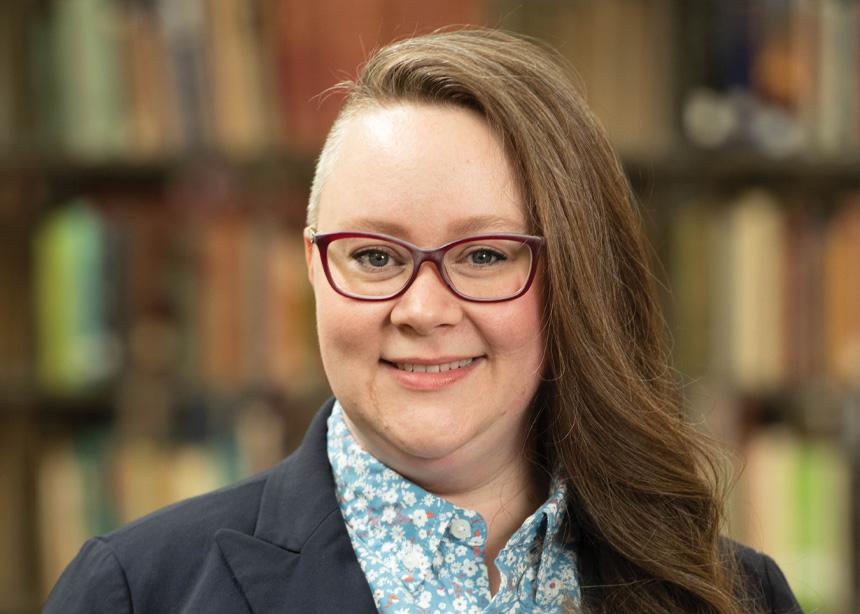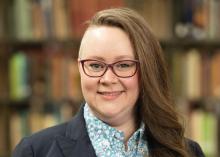Debbie Bledsoe wants people to know about the beauty she sees in the Mennonite Church.
“I think people who grew up in it lose sight of what makes Anabaptism unique,” she says.
Today, Bledsoe is the pastor at First Mennonite Church in Edmonton, Alberta. But her teenage years were spent in a Nazarene church in Fayetteville—a city in North Carolina next to Fort Liberty (formerly Fort Bragg), a military base once described as “the centre of the military universe.”
Bledsoe initially felt at home in the Nazarene church, but she was troubled when it became clear to her that church leadership believed it was not a young woman’s place to ask questions about God and scripture.
The church had a U.S. flag in front of it and held special services on Memorial Day and Independence Day. Those ties to the military increased after the 9-11 terrorist attacks.
“I remember these discussions in church around the righteousness of war—how it was our calling to essentially go to war to kill Muslims because they were against God.”
In Bledsoe’s eyes, those views didn’t match Jesus’ teachings. That dissonance, along with her growing sense of her queerness in a church that didn’t accept LGBTQ+ folks, led Bledsoe to stop attending the church.
Bledsoe met her now-wife, Emily, at the church. They married in 2009 and, over the course of about seven years, tried two dozen churches in numerous denominations in their effort to find a place that affirmed their sexuality and aligned with their idea of what it means to follow Jesus.
“For a little while, we abandoned our search,” Bledsoe says. “We thought we’d have to honour God in a private way instead of in a church.”
Things changed when Emily filled out an online quiz for fun. The quiz promised to identify the Christian denomination respondents belonged to. The quiz told Emily, “You are Mennonite,” a denomination she and Bledsoe were not familiar with.
They investigated, and the more they read, the more they were drawn to Mennonites.
“It was so powerful—kind of like finding God all over again in a way,” Bledsoe says. “It was so ground-breaking and so shocking because I’d never heard of most of these things before.”
One of the first characteristics of Anabaptism that stood out to Bledsoe was the priesthood of all believers. For someone who grew up being taught that scriptural interpretation was the domain of men in leadership, the idea that there is no spiritual divide between ministers and laity “shook the foundation of my world,” Bledsoe says.
Believer’s baptism also stood out to Bledsoe. “Finding out there were people who care about baptism as something you can choose and that changes your life made so much sense.”
Pacifism was another key characteristic that attracted Bledsoe and her wife to the Mennonite Church.
“So many people that I knew growing up—both my dad and stepdad were in the army—justified with glee and joy either their training to murder or the actual murder they had committed because Jesus called them to do it. To find that there are Christians that know the God I know and that love the Jesus I know, and don’t believe that just because we believe in Jesus we are called to kill, that was just so overwhelming.”
The couple searched the internet for an affirming Mennonite church in their area and discovered one close to their home. The congregation was led by a woman pastor, welcomed queer folks, cared for the poor and participated in community organizing—all things that appealed to the couple.
“It was like magic,” Bledsoe says. “To feel like I’m lost and I’ll never find my way home, and then I find the home is just a 10-minute drive.”
The couple joined the church in 2017. In 2020, after encouragement from her pastor and others around her, Bledsoe made the decision to study at Anabaptist Mennonite Biblical Seminary. She graduated in 2022 and moved to Alberta last year.
“I have so much energy and joy for this faith community and for this work that I have been called to, which still astonishes me every day. I can’t believe my good fortune,” she says.
“There is so much vibrancy and life and beauty in our faith structures. Sure, things get hard and we get bogged down in the weeds sometimes, but given my experiences from before—all the things I went through, all the things I was taught that were harmful—there’s so much joy in its place now.”






Add new comment
Canadian Mennonite invites comments and encourages constructive discussion about our content. Actual full names (first and last) are required. Comments are moderated and may be edited. They will not appear online until approved and will be posted during business hours. Some comments may be reproduced in print.